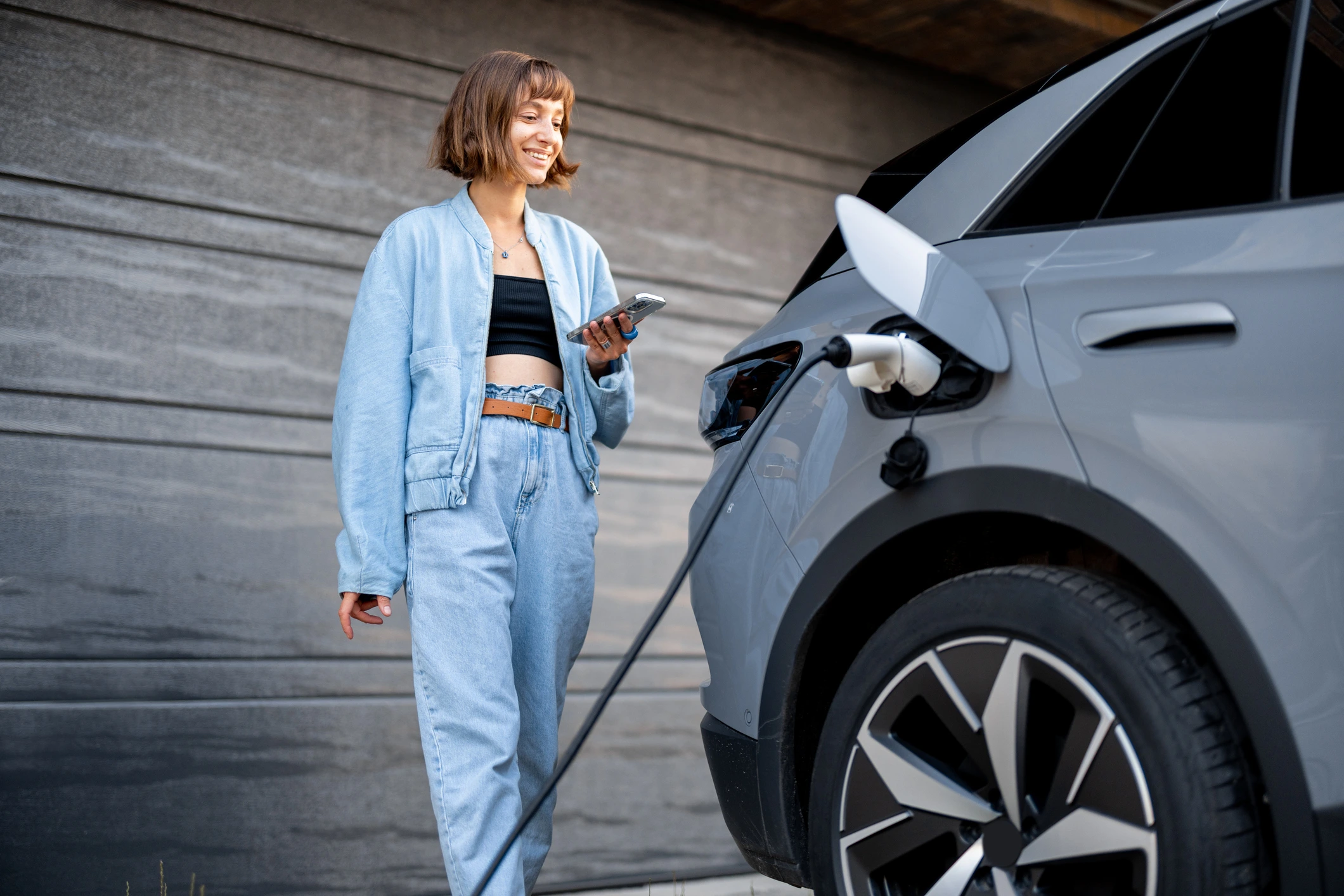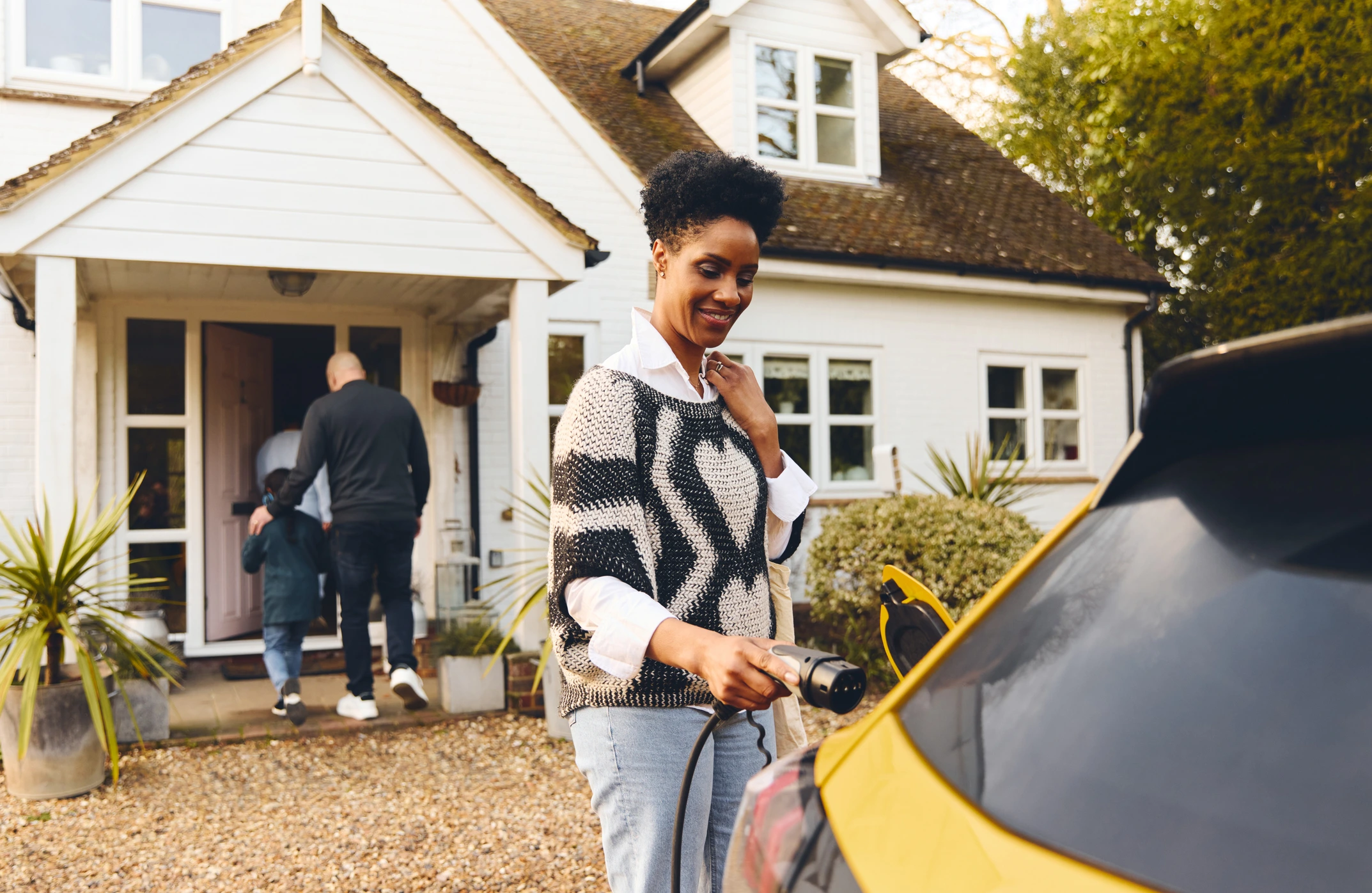September 2025
How do you charge an electric car
Not sure how to charge an electric car? Learn how to charge at home or in public, and explore charger and plug types, charging costs and top tips.

Charging an electric car is a bit like charging your phone. Just plug it in and power up. Whether you're at home or on the go, it's easy to keep your battery topped up and ready to roll. Let’s break down how it works.
Where can you charge an electric car?
Charging your EV is easier than ever, with options to suit your lifestyle, whether you're at home, work, or out and about.
Charging at home
To charge at home you need off-street parking to get a wall-mounted charger installed. Usually on your driveway or garage.
Benefits:
- Convenience: Charge overnight while you sleep, so your EV is ready to go when you are.
- Cost: Home charging is often cheaper than public charging. And if you switch to our So EV tariff when you get one of our chargers installed, you could be charging for up to 92% less than in public – at just 1.4 pence per mile.
- Speed: Home chargers are much faster than a standard 3-pin plug and can fully charge most EVs in 6 to 10 hours.
We install a range of the UK’s most popular chargers, including Myenergi, Hypervolt, and VCHRGD, from £899 – and that includes personalised advice from your very own dedicated EV expert.
Find out everything you need to know about EV charger installation in our handy blog.
Charging at work
Many workplaces now have carparks with EV bays for their team to top up.
Benefits:
- Convenience: Charge while you work – no extra stops on the way home needed.
- Cost: Some employers offer free or subsidised charging.
- Speed: Workplace chargers are similar to home chargers, which is ideal for a full day’s charge.
Charging in public
When you're out and about, public charging makes it easy to keep your EV ready to go. Whether you're shopping, travelling, or running errands.
Benefits:
- Speed: Rapid chargers can give you 80% charge in 30 to 60 minutes.
- Accessibility: There are thousands of public chargers across the UK, at places like supermarkets, leisure centres, petrol stations, as well as on the street.
- Flexibility: No need for range anxiety, public charging is perfect for long journeys or when you're away from home.
What types of EV chargers are there?
EV chargers come in different speeds to suit different needs, from slow overnight charging to ultra-fast top-ups on the go.
Slow chargers (up to 3kW)
It’s possible to plug your EV directly into a standard plug socket, but we don’t recommend it, as it may strain your household wiring. This can lead to electrical faults, overheated sockets, and other issues. Plus, the power it gives is very limited, slow and inefficient.
Fast chargers (7–22kW)
Wall-mounted home chargers, workplace chargers and some public chargers are fast and offer a convenient way to charge if you have a few hours to spare.
Charge time: 8 to 10 hours for a full charge
Best for: Daily and overnight charging
Benefits: A good balance of speed and cost
Disadvantage: Needs to be installed at home, and public charging costs can vary widely.
Rapid and ultra-rapid chargers (50–350kW)
When you’re away for home, these are the chargers to look for in motorway services, retail parks and EV charging hubs.
Charge time: 30 to 60 minutes for 80% charge
Best for: Quick top-ups on the go
Benefits: Fantastic for long trips and busy schedules
Disadvantage: More expensive and not all EVs are compatible. Plus, if used too often, rapid charging can degrade your battery.
What are the EV plug types and connectors?
Different EVs and charging speeds use different plug types. Here’s a quick guide to the most common ones, and where you’ll find them.
Type 1 and Type 2
Type 1
- Used by: Older EV models (mostly from Asia and North America)
- Charging speed: Slow to fast (up to 7kW)
- Where you’ll find it: Home chargers, some public stations
- Note: Becoming less common in the UK and Europe
Type 2
- Used by: Most modern EVs in the UK and Europe
- Charging speed: Fast (up to 22kW)
- Where you’ll find it: Homes, workplaces, public chargers
- Benefits: Standardised across Europe, compatible with most AC chargers
CCS and CHAdeMO
CHAdeMO
- Used by: Some older EVs (e.g. Nissan Leaf)
- Charging speed: Rapid (up to 100kW)
- Where you’ll find it: Some public rapid chargers
- Note: Less common now, being phased out in favour of CCS
CCS (Combined Charging System)
- Used by: Most new EVs in the UK and Europe
- Charging speed: Rapid and ultra-rapid (50–350kW)
- Where you’ll find it: Motorway services, EV hubs, retail parks
- Benefits: Supports both AC and DC charging, fast and widely adopted
How do you charge an EV at home?
Charging your electric car at home is one of the most convenient and cost-effective ways to keep your EV powered.
Install a home charging unit
A wall-mounted charger is installed by a professional and connected to your home’s electricity supply.
What you need:
- A wallbox charger (typically 7.4kW, or 22kW if your property has a 3-phase supply)
- Professional installation
- Off-street parking (e.g. driveway or garage)
Charge time:
- Around 8 hours for an average EV (60kWh battery), but varies depending on your battery size
- Faster options (up to 22kW) available but require a 3-phase power supply
Smart features:
- App control
- Scheduled charging for off-peak rates
- Solar panel compatibility available on some charger models
How do you charge an EV in public?
Public charging makes it easy to top up your EV while you're shopping, commuting, working, or on a long journey.
Common public charging locations
You’ll find public chargers in places like:
- Supermarkets and retail parks
- Leisure centres and car parks
- Petrol stations and motorway service stations
- Hotels and restaurants
- Some workplaces
Benefits:
- Convenient while you’re doing other things
- Rapid chargers available for quick top-ups
- Often located near amenities
To pay: use contactless, RFID, or an app
Most public chargers offer flexible ways to pay such as:
- Contactless card: Tap and go with no account needed
- RFID card: Linked to a specific charging network account
- Mobile apps: Manage payments, track use, and find nearby chargers
Tip: Some apps also show real-time availability and pricing.
Accessing different public networks
There are many charging networks across the UK, including:
ESB, Osprey, Pod Point, Instavolt, bp pulse, and IONITY
How to access them:
- Sign up via their app or website
- Use a contactless card
- Some networks offer subscriptions for lower rates
Workplace charging often uses these same networks, or private systems. If your employer offers EV charging, you might be able to use your usual app or RFID card. Or they might provide access through a company account.
How much does it cost to charge an electric car?
Charging costs vary depending on where and how you charge your EV. Here's a quick breakdown to help you understand the difference between home and public charging.
Charging at home
- Typical cost: Around 27p/kWh (can be as low as 6.5p/kWh overnight with our So EV tariff)
- 80% charge (60kWh battery): 4 to 8 hours
- Cost per mile: 8p (or as low as 1.4p with one of our partner EV chargers and EV tariff)
- Best for: Regular overnight charging and lower running costs
Charging in Public
- Fast chargers (7 to 22kW): About 50p/kWh, which works out at around £24 for 80% charge
- Rapid chargers (50–99kW): About 70p/kWh, which works out at around £33.60 for 80% charge
- Ultra-rapid chargers (100kW+): About 73 to 79p/kWh which works out at around £35+ for 80% charge
- Cost per mile: About 25p (at ultra-rapid rates)
- Best for: Quick top-ups on the go or long journeys
How long does it take to charge an electric car?
Charging time depends on three main things:
- The size of your car’s battery
- The type of charger you’re using
- How much charge your battery needs
Very broadly:
- A slow charger (up to 3kW) can take over 12 hours.
- Fast chargers (7 to 22kW) typically take 4 to 8 hours.
- Rapid chargers (50 to 99kW) can deliver 80% charge in just 30 to 60 minutes.
- Ultra-rapid chargers (100 to 350kW) can do the same in just 20 to 30 minutes.
Find out more details about how long it takes to fully charge an electric car in our useful blog.
Final word on charging your EV
Charging an electric car is a simple part of EV driving. With a growing UK network of charge points, and more innovative tech being developed, staying topped up is becoming easier and more convenient. Going electric is a smarter, cheaper and more sustainable move for the road ahead.
EV charging FAQs
Can I charge an electric car using a regular home socket?
It's possible, but we don't advise it as it can overload your home wiring and lead to electrical faults.
Do I need special equipment to charge my EV at home?
For faster and safer charging, it's recommended to install a dedicated home EV charger.
How do I find public EV chargers near me?
You can use apps like ESB, Zap-Map, PlugShare, or Google Maps to locate nearby public EV charging stations.
Is it safe to leave an EV charging overnight?
Yes, it’s generally safe to charge your EV overnight, especially with a properly installed home charger.
What’s the difference between fast, rapid, and ultra rapid charging?
Fast chargers typically deliver 7 to 22kW, rapid chargers around 50kW, and ultra rapid chargers 100kW or more. The quicker the charger, usually the more expensive it is to charge.
What's a 3-phase supply?
A 3-phase supply delivers more power than standard single-phase, making it ideal for large homes or businesses with high energy needs. It’s more stable and efficient, but installation can be costly.






%202.webp)
